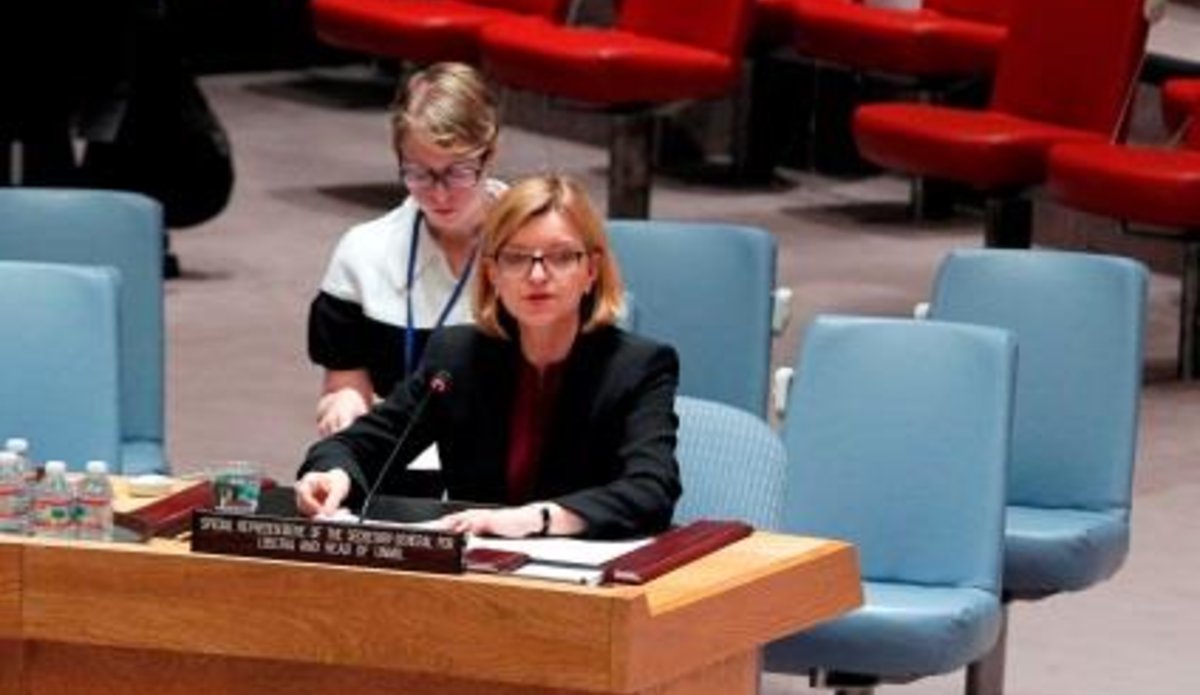SRSG briefs UN Security Council on UNMIL’s Progress
New York/Monrovia, 20 March 2014-- Briefing the United Nations Security Council today, the Special Representative of the Secretary-General (SRSG) and Coordinator of UN Operations in Liberia, Ms. Karin Landgren, lauded Liberia’s progress as it enters its second post-conflict decade but noted that Liberia continues to face complex and daunting challenges to institutionalizing reforms in critical sectors and building capacity for effective governance.
“Seizing this window to get the fundamentals right will be critical for consolidating Liberia’s hard-won peace, and for charting the country’s inclusive development,” she said.
The UN envoy highlighted advances in Liberia’s important reform processes, including decentralization, constitutional review, and national reconciliation, while noting that progress had been slow in some areas. These critical reforms “are fundamental for the country's future, more inclusive, character,” said Ms. Landgren, noting that delays in the constitutional review process “could risk compromising the quality of public consultation and could create a lost opportunity to incorporate the public’s views.”
Turning to the issue of reconciliation, Ms. Landgren noted that implementation of the Reconciliation Roadmap had made some progress, particularly in areas funded by the international community, but that the Government's contribution to its implementation has been limited. She also noted that although the Palava Hut initiative was launched in October, implementation had not yet begun.
Noting that accountable and transparent governance is essential to Liberia’s continued stability, the SRSG welcomed recent efforts of the Liberia Anti-Corruption Commission towards greater accountability. She also highlighted important efforts made by the Ministry of Lands, Mines and Energy and the Liberia Extractive Industries Transparency Initiative to strengthen frameworks for accountability, transparency and consultation in the management of natural resources. “I cannot overstate the importance of greater accountability, transparency and consultation with communities in Liberia’s valuable natural resource sector,” she said.
Ms. Landgren said that the second phase of UNMIL’s military drawdown would be completed in June, and at that time, half of Liberia’s counties would no longer have a fixed UNMIL military presence. She underscored the “exceptional collaboration” between UNMIL and the Government in the transition planning process, and the commitments made by the Government to boost the security sector, including the recent personal engagement of the Minister of Finance to make transition-specific funds available for a number of security institutions. She also noted that “detailed joint planning, government and UNMIL dialogue with communities, and the calibrated and gradual phasing of the drawdown have been instrumental in allaying concerns, while making clear the goals to be reached by Liberia’s security institutions.”
The SRSG noted the important progress made in Liberia’s security sector, which is critical for a successful security transition. Highlighting that the Liberia National Police (LNP) would be bearing the greatest burden of the transition, Ms. Landgren explained that the LNP undertook a comprehensive baseline assessment in 2013, which formed the basis for a new strategic plan and development framework, to be signed soon; and that a similar process would be undertaken with the Bureau of Immigration and Naturalization later this year. She also noted that “an effective security sector needs to work with a functioning criminal justice system that inspires public trust.”
The UN envoy hailed the steady progress made towards durable solutions for some 46,000 Ivorian refugees who remain in Liberia, and lauded plans for the Governments of Liberia, Côte d’Ivoire, and the United Nations High Commissioner for Refugees to resume the work of the Tripartite Commission this month. With the closure of the UN Integrated Peacebuilding Office in Sierra Leone this month, the SRSG reflected on stability returning to West Africa, and to Liberia’s neighbors. However, she emphasized the need to remain conscious of regional and national watershed events to come, including presidential elections in 2015 in Guinea and Côte d'Ivoire and in 2017 in Liberia. “Much is at stake here,” she said, “and stability and confidence will need to be maintained.”
The Special Representative concluded her remarks by acknowledging the enormous global demands on UN peacekeeping and the pressures to direct resources where they are most needed. She said that “continuing to manage an appropriate exit strategy from Liberia, in whose stability the international community has invested so much, will remain a delicate challenge” for UNMIL and the Security Council.
For further information, please contact:
Mathew Elavanalthoduka: +231-0770-31 5225, 0770319153 mathew@un.org
Seble Worku mobile: +231 – 0770-31 5213/9157 email: seblewongel@un.org
Ruby Ofori +231-0770319152/5237 email ofori@un.org
UNMIL website: unmil.unmissions.org
 UN
UN United Nations Peacekeeping
United Nations Peacekeeping





